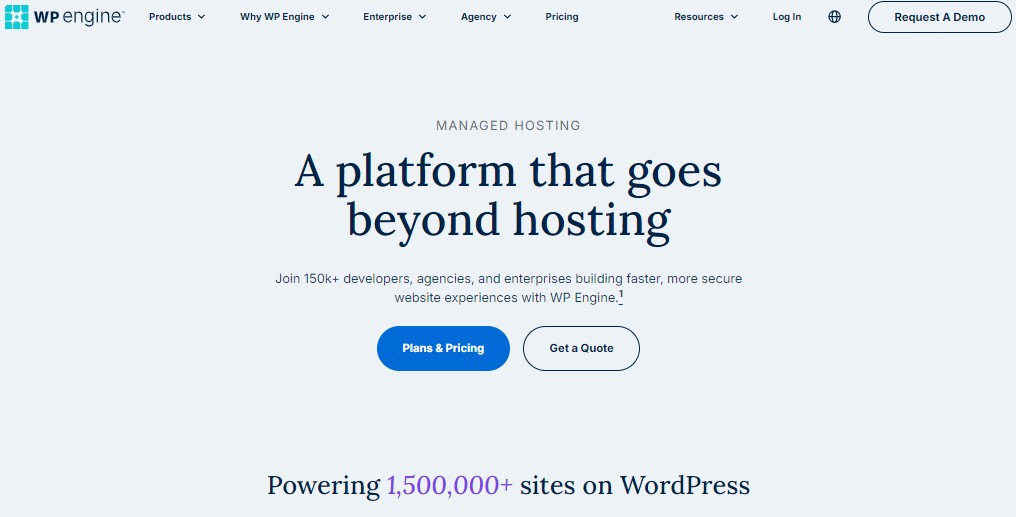TechRadar Verdict
A fully-featured managed WordPress hosting service at a reasonable price, WP Engine is a solid choice for SMEs to host a WordPress website.
Pros
- +
Excellent 24/7 customer support
- +
Includes all major features you could want
Cons
- -
Cheaper managed WordPress hosting exists
- -
Extensive features could intimidate newcomers
Why you can trust TechRadar
One in twelve people online visit a website hosted on WP Engine daily. They host over one and a half million sites across 150 countries and still maintain a customer satisfaction rate of 96%. That is reliable hosting.
WP Engine uses its own caching system and content delivery system (CDN) and your get your choice of data centers in North America, Europe, or Asia. Plus, your websites are hosted on the fast Google Cloud Platform. This all means your customers should have a better user experience because of faster loading times and reliability.
WP Engine’s managed WordPress hosting solution
WP Engine provides everything needed for a true managed WordPress solution, including automatic PHP and WordPress updates, effortless backups, all without compromising on security and speed. With techradar10 you can get an additional 10% off at checkout .
WP Engine manages your WordPress site for you making the day-to-day running of your site easier allowing you to focus on your business. In addition, WP Engine provides features like automatic plugin updates, malware detection, and automated backups. Although managed hosting comes at a higher cost than unmanaged, it's not until a vulnerability is discovered at 2am on a Saturday that the value of having someone look over the security and updates of your server becomes really noticeable.
If you run a digital or marketing agency, WP Engine also offers a hosting solution to support managing multiple clients. Whether you have 5 or 50+ clients on your books, shared and container-based servers are available, complete with the same managed WordPress experience and updates to PHP, MySQL, and of course, WordPress itself.
The startup spec for these hosting plans is 25GB of storage, supporting 50,000 visits per month, two sandbox sites and five live sites. Various configurations can be selected, designed to enable easy scaling as your client base expands and your business evolves. Specific agency hosting features are included, such as bulk site management, Git integration and other developer tools, and as the plans increase in price, things like WooCommerce optimizations, Stripe Connect checkouts, data insights, and a dedicated WP Engine API.
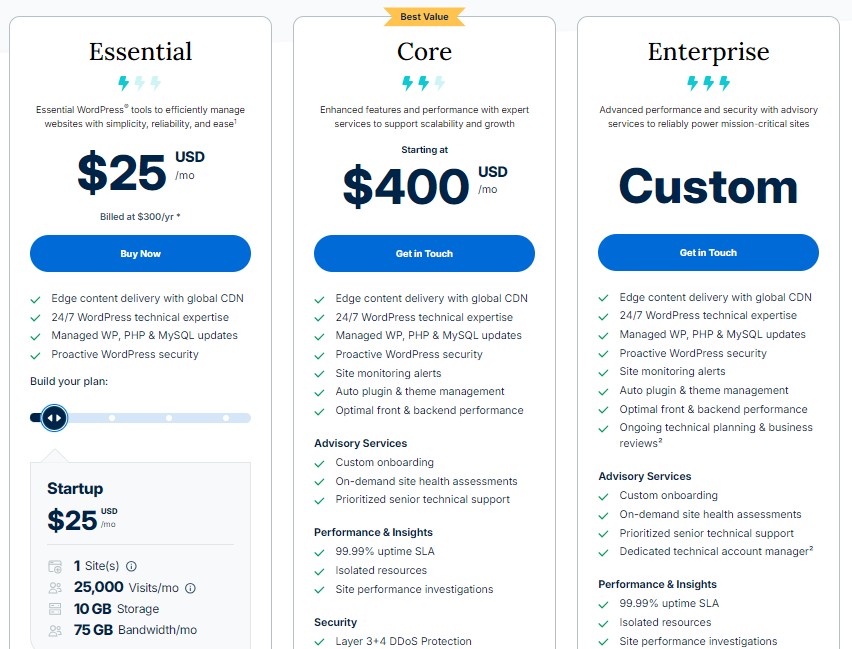
WP Engine Plans and pricing
WP Engine have three main types of hosting: WordPress Hosting, WooCommerce Hosting, and Headless.
WordPress hosting has five plans which are all on a shared infrastructure. The most basic plan is Startup which provides hosting for one site, 25,000 monthly visits (with a 50GB bandwidth cap which is enough for the average website), and 10GB local storage.
Sign up to the TechRadar Pro newsletter to get all the top news, opinion, features and guidance your business needs to succeed!
With this plan you get chat only support, security patching, plugin risk scans, daily backups, EverCache, and global CDN. This plan is $20/mo and refreshingly there are no confusing renewal prices.
From there onwards, the plans support 3, 10, and 30 sites and the bandwidth, storage space, and monthly visits increase as you would expect. There is also the option to completely customize your plan starting from $600/mo.
For WooCommerce, the plans are similar in their specs and what they support but they come with lots of features as standard such as elastic search capabilities, support for unlimited products, Live Cart, and more. These plans are slightly more expensive than the WordPress hosting plans and the custom plan costs a minimum of $800/mo.
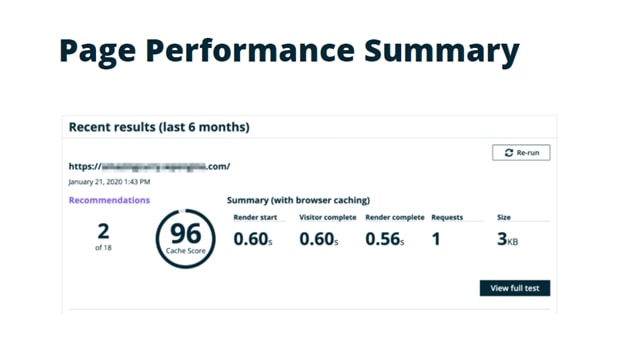
Features
The core reasons to choose WP Engine over cheaper WordPress hosting are increased reliability, performance, support, and management, but these are hard to quantify. Some features stand out when you browse the interface, however, that can give you some insight into the service offered.
WP Engine Page Performance is a neat tool designed to help you speed up your WordPress site by offering meaningful metrics on performance.
Running a test returns you a page-performance report that details how quickly your page rendered, how long it took to load in its entirety, and the total size of the page. It even includes historical data on your site’s performance over the past six months and recommendations on how you can reduce page load.
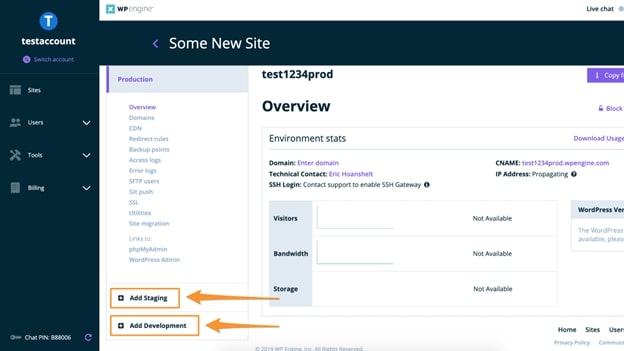
Avoid embarrassing mistakes on your site by making changes to a copy of your website before it goes live. This is called Staging, and it allows your developers to make extensive changes to your site without affecting your customers.
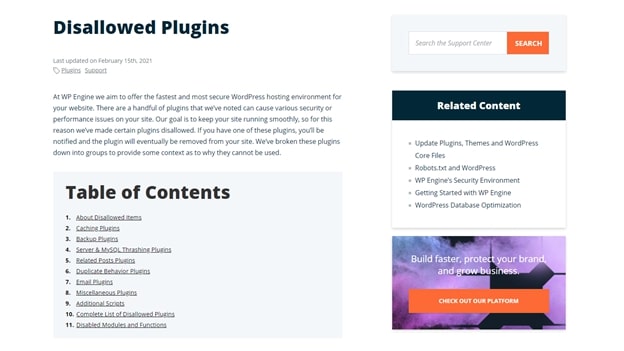
In a relatively unusual move, WP Engine restricts the WordPress plugins you can install. Those typically restricted are plugins that have been noted to cause performance issues and security holes. For important features such as caching, backups, and search engine optimization tools, WP Engine has made alternatives available that don’t put a high load on the server.
Interface and in use
WP Engine’s interface is professional and well laid out, but the powerful features might mean a steep learning curve for inexperienced users. If you have an understanding of terms like Git, CNAME, and redirect rules, you’ll be right at home here, but otherwise you’ll need to spend some time on the support site.
Creating a site in WP Engine is made simple, thanks to a straightforward process. Whether you’re hosting on a domain, or building a staging site, the process is automated, so you don’t need to do anything. Once the name of the site has been set, and you’ve decided on adding WordPress on its own, or Word Press with WooCommerce, it will self-install while you make a coffee.
Note that WP Engine doesn’t offer any AI-guided site generation tools here. Anything you create will have to be done manually through the current WordPress theme management environment.
One of the main attractions for many customers is promised easy migration. Intended to make it simple to move a WordPress site from one host to another, WP Engine offers a dedicated plugin specifically for this purpose. Using it is simple enough – you install the downloadable plugin on the source (old) web host, create a secure key when prompted, then paste this into the plugin on your WP Engine hosting. In testing, the migration of a site around 500MB in size was pretty slick, completing in just a few minutes.
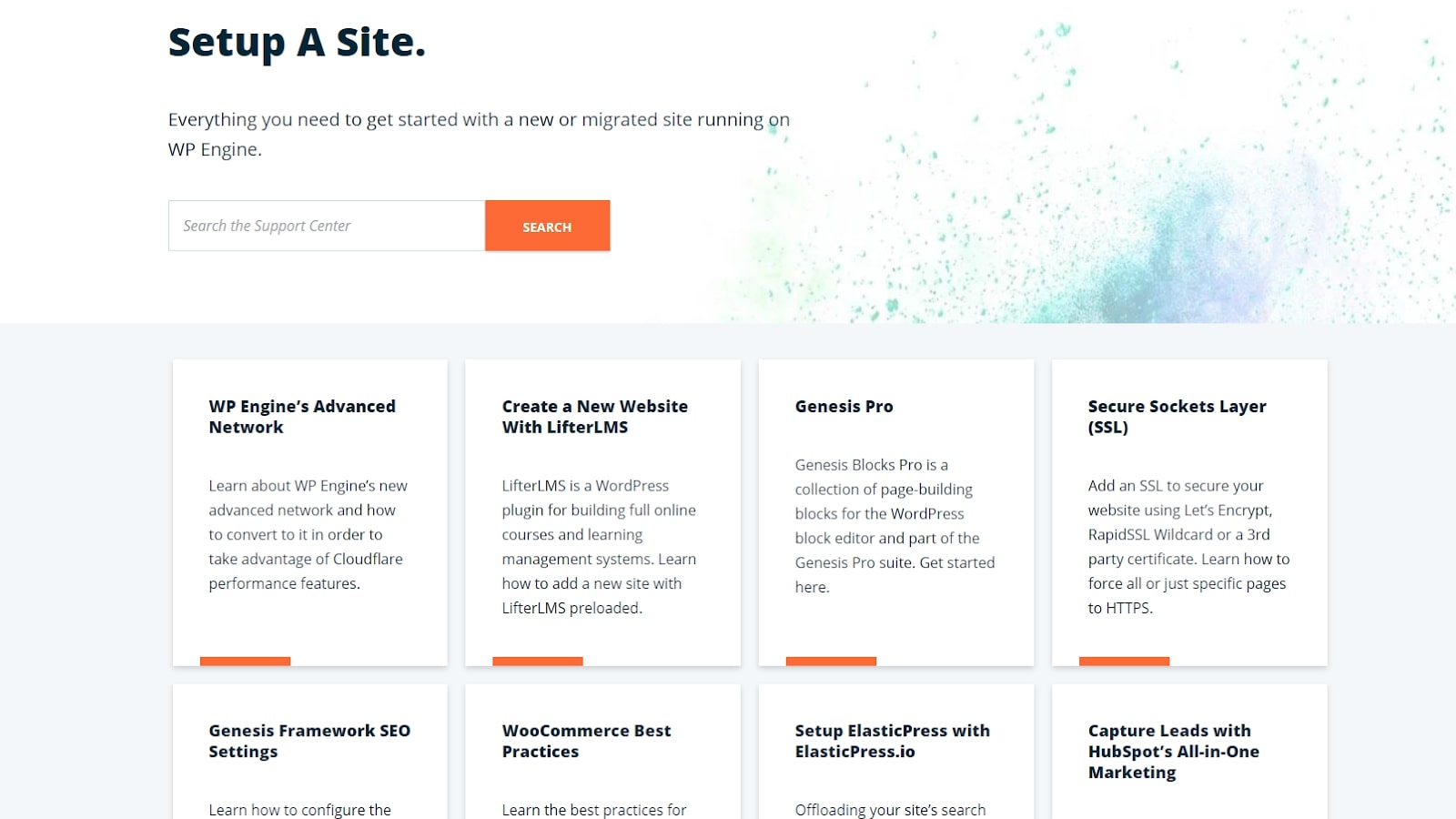
Support
A managed WordPress service should offer extra value through its support, and WP Engine delivers. The support site includes videos and articles of a quality you’d expect from a paid training course, with help on deeper WordPress functionality that many WordPress hosts don’t go into.
There’s 24/7 live chat support and a ticket system, too. In our testing, the response was quick and the agent knowledgeable. For all plans except for single-site plans, there’s telephone support, too.
While WP Engine has a strong collection of support resources, we found that its sales team were not as well-informed as they could be. Specifically on the topic of agency hosting plans, they seemed to be unaware as to some of the intricacies. We have been separately informed by WP Engine contacts that the agency hosting plans rely on shared hosting for the Agency Essential plans, scaling up to container-based hosting for Agency Plus and Agency Pro. However, two conversations via the online chat tool revealed that the sales team were under the impression that all agency plans use container hosting.
If you’re planning to use WP Engine for agency hosting, and as it isn’t easy to find the answer within the support resources, you might consider requesting a call or email conversation with their tech support to establish whether they suit your requirements.
Testing
Testing the performance of WP Engine – specifically, the Essential Startup – I was intrigued to find that while reasonably slick, it seemed slower than other hosts. Now, I’ll preface this with the knowledge that WP Engine specifically aims for efficient WordPress hosting. It is known to block some plugins that can affect performance; it opts for its own caching plugin, for example. So, gauging performance with benchmarking tools on WP Engine is a little different to other hosts.
However, the tests delivered results around 30% slower than other hosts. Given that the comparisons were with plans for a similar budget and server specification, I was surprised at how poorly WP Engine scored.
show more
Performance metric | Result |
Operations with large text data | 6.9 |
Random binary data operations | 7.93 |
Recursive mathematical calculations | 5.06 |
Iterative mathematical calculations | 7.9 |
Filesystem | Row 5 - Cell 1 |
Filesystem write ability | 7.79 |
Local file copy and access speed | 8.25 |
Small file IO test | 9.76 |
Database | Row 9 - Cell 1 |
Importing large amount of data to database | 1.94 |
Simple queries on single table | 6.66 |
Complex database queries on multiple tables | 5.78 |
Object cache | Row 13 - Cell 1 |
Persistent object cache enabled | 0 |
Network | Row 15 - Cell 1 |
Network download speed test | 9.5 |
Server score | 6.4 |
Performance Metric | 5 concurrent visitors | 9 concurrent visitors |
Transactions | 9583 | 17028 |
Availability | 96.28 | 96.31 |
Elapsed time | 299.70 | 299.33 |
Data transferred | 106.33 | 189.25 |
Response time | 0.15 | 0.15 |
Transaction rate | 31.98 | 56.89 |
Throughput | 0.36 | 0.63 |
Concurrency | 4.84 | 8.15 |
Successful transactions | 9578 | 17028 |
Failed transactions | 370 | 652 |
Longest transaction | 2.25 | 5.67 |
The competition
If it’s the higher level of customer support you value in a managed WordPress host, Liquid Web often tops customer satisfaction polls. It has a focus on high-end products like virtual private servers (VPS) and dedicated servers, so if your needs extend beyond a high-performance WordPress site into other software solutions, we recommend checking it out.
TsoHost is another managed web hosting provider we recommend. The price can ramp up, with even the most basic VPS options starting at $52 per month, but you get a level of on-hands customer support that’s virtually unrivaled.
If managed WordPress hosting is your primary motivation, however, one of WP Engine’s key competitors is Kinsta. Both offer a managed hosting environment specifically geared towards WordPress, along with a similar price point. However, Kinsta doesn’t allow manually migrated data, so if you prefer to be more hands-on, WP Engine is the better option.
You might opt for Kinsta in another scenario, however. While WP Engine has a solid set of agency hosting plans, we found that while it omits smaller scale agency plans, Kinsta bundles in more features and boasts superior performance.
Final verdict
WP Engine is not the cheapest hosting around and it doesn't seem to be the fastest either. It's also not the first WordPress host we’d recommend to newcomers, as the breadth of tools can be intimidating.
WP Engine used to be the champion of WordPress hosting but I think that's starting to change with hosts like SiteGround and Kinsta taking over.

James is a tech journalist covering interconnectivity and digital infrastructure as the web hosting editor at TechRadar Pro. James stays up to date with the latest web and internet trends by attending data center summits, WordPress conferences, and mingling with software and web developers. At TechRadar Pro, James is responsible for ensuring web hosting pages are as relevant and as helpful to readers as possible and is also looking for the best deals and coupon codes for web hosting.
You must confirm your public display name before commenting
Please logout and then login again, you will then be prompted to enter your display name.
